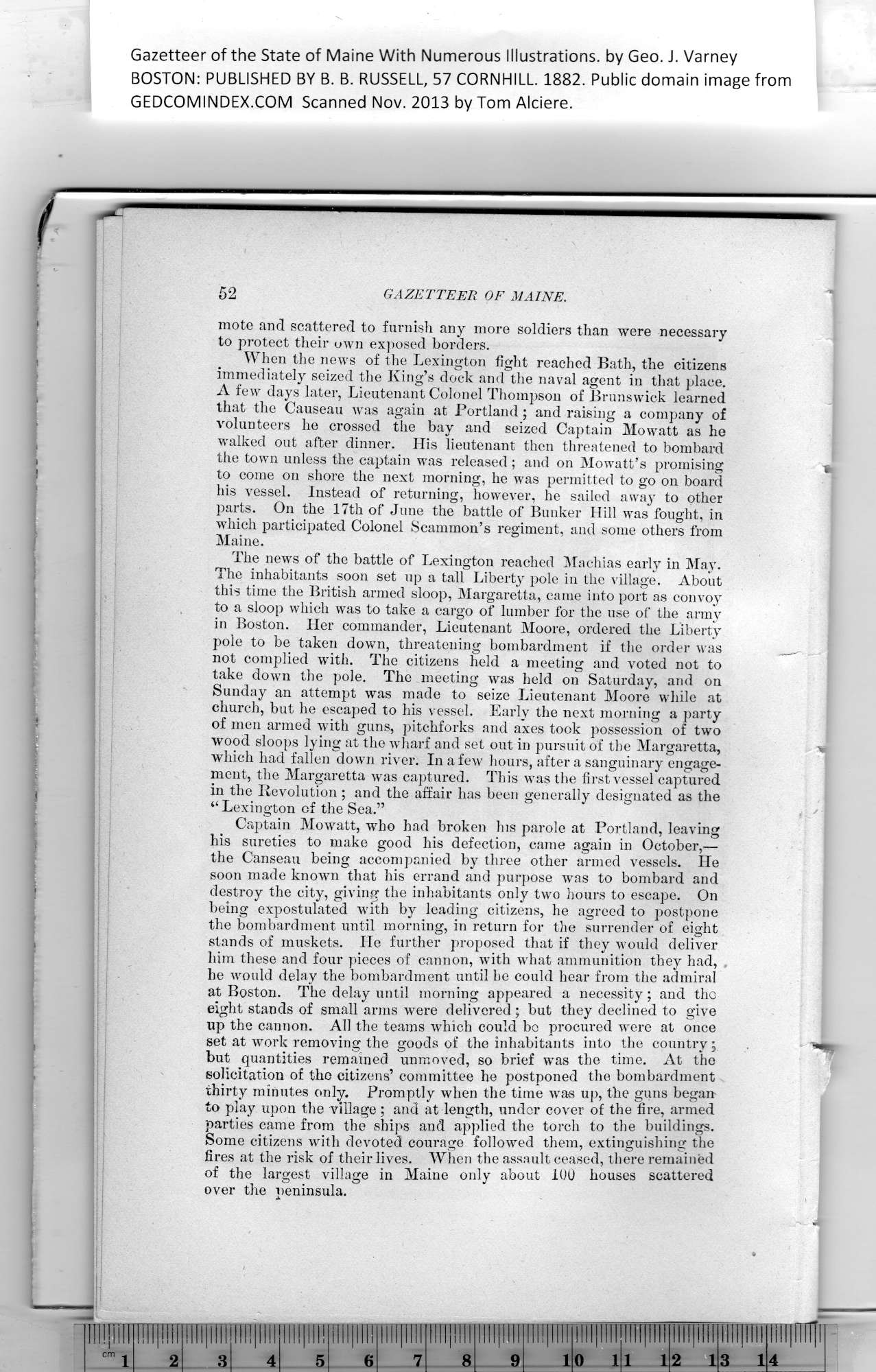|
Gazetteer of the State of Maine With Numerous Illustrations, by Geo. J. Varney
BOSTON: PUBLISHED BY B. B. RUSSELL, 57 CORNHILL. 1882. Public domain image from
52 GAZETTEER OF MAINE.
mote and scattered to furnish any more soldiers than were necessary
to protect their own exposed borders.
When the news of the Lexington fight reached Bath, the citizens
immediately seized the King’s dock and the naval agent in that place.
A few days later, Lieutenant Colonel Thompson of Brunswick learned
that the Causeau was again at Portland ; and raising a company of
volunteers he crossed the bay and seized Captain Mowatt as he
walked out after dinner. His lieutenant then threatened to bombard
the town unless the captain was released ; and on Mowatt’s promising
to come on shore the next morning, he was permitted to go on board
his vessel. Instead of returning, however, he sailed awa}’ to other
parts. On the 17th of June the battle of Bunker Hill was fought, in
which participated Colonel Scammon’s regiment, and some others from
Maine.
The news of the battle of Lexington reached Machias early in May.
The inhabitants soon set up a tall Liberty pole in the village. About
this time the British armed sloop, Margaretta, came into port as convoy
to a sloop which was to take a cargo of lumber for the use of the army
in Boston. Her commander, Lieutenant Moore, ordered the Liberty
pole to be taken down, threatening bombardment if the order was
not complied with. The citizens held a meeting and voted not to
take down the pole. The meeting was held on Saturday, and on
Sunday an attempt was made to seize Lieutenant Moore while at
church, but he escaped to his vessel. Earlv the next morning a party
of men armed with guns, pitchforks and axes took possession of tw’o
wood sloops lying at the wharf and set out in pursuit of tbe Margaretta,
which had fallen down river. In a few hours, after a sanguinary engage-
ment, the Margaretta was captured. This was the first vessel captured
in the Revolution ; and tbe affair has been generally designated as the
“ Lexington of the Sea.”
Captain Mowatt, who had broken his parole at Portland, leaving
his sureties to make good his defection, came again in October,—
the Canseau being accompanied by three other armed vessels. He
soon made known that his errand and purpose was to bombard and
destroy the city, giving the inhabitants only two hours to escape. On
being expostulated with by leading citizens, he agreed to postpone
the bombardment until morning, in return for the surrender of eight
stands of muskets. He further proposed that if they would deliver
him these and four pieces of cannon, with what ammunition they had,
he would delay the bombardment until he could hear from the admiral
at Boston. The delay until morning appeared a necessity; and the
eight stands of small arms were delivered; hut they declined to give
up the cannon. All the teams which could bo procured were at once
set at work removing the goods of the inhabitants into the country
but quantities remained unmoved, so brief was the time. At the
solicitation of the citizens’ committee he postponed the bombardment
thirty minutes only. Promptly when the time was up, the guns began
to play upon the village ; and at length, under cover of the fire, armed
parties came from the ships and applied the torch to the buildings.
Some citizens with devoted courage followed them, extinguishing the
fires at the risk of their lives. When the assault ceased, there remained
of the largest village in Maine only about 100 houses scattered
over the peninsula.
PREVIOUS PAGE ... NEXT PAGE
This page was written in HTML using a program written in Python 3.2
|
